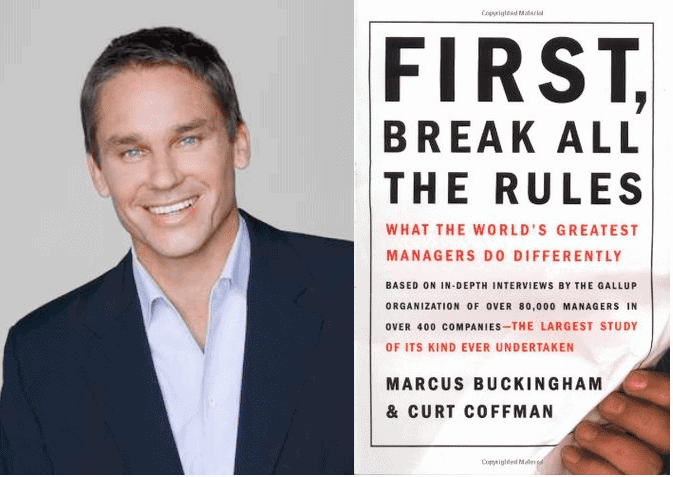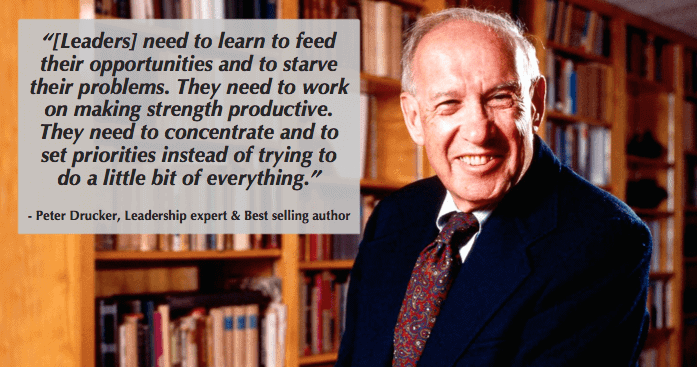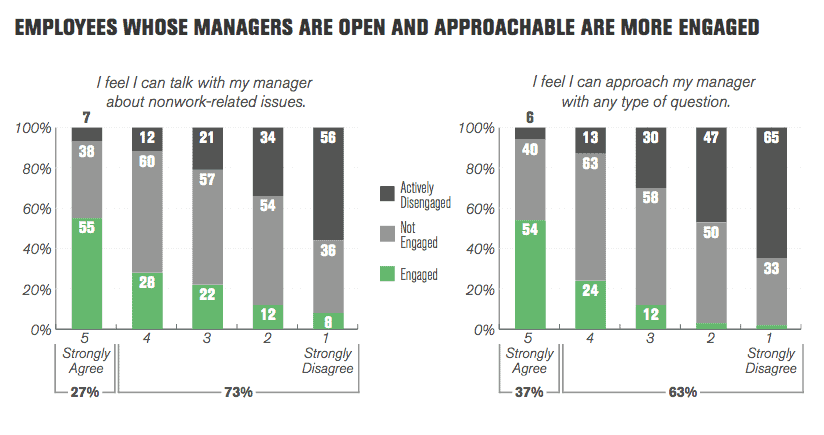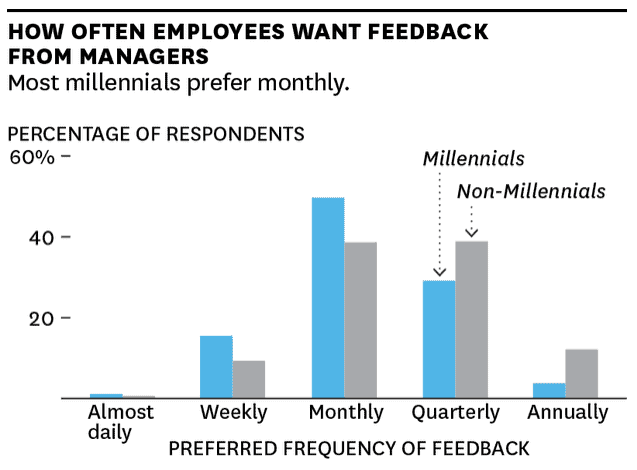Marcus Buckingham has been working to help managers for decades. His research with Gallup is some of the most comprehensive in the world.
The culmination of much of that research is in the book, "First, Break All the Rules." It looks at dozens of Gallup's best surveys and studies from over 1 million employees and 80,000 managers. In his reviews of this research, Marcus Buckingham found that there were many unconventional lessons we can all learn from the best managers.
We highly recommend you check out the book, and today we're highlighting a few of the best lessons you'll find in "First, Break All the Rules."
3 Unconventional Lessons from Gallup's Marcus Buckingham in "First, Break All the Rules"
Buckingham and Gallup are strong proponents that people leave managers, not companies. As they put it, "How long [an] employee stays and how productive he is while he is there is determined by his relationship with his immediate supervisor."
So the question becomes: What separates a great manager from the rest?
It turns out, it's a series of habits that may not be what you expect. Here's a few you can apply today:
1) Focus on the strengths of each person on your team.
It can be easy to dwell on your people's weaknesses. You must work hard to eliminate them, right?
No so fast.
Instead, to get the best out of your people, focus on their strengths.
Why? As Gallup found:
"People who focus on their strengths every day are 6 times more likely to be engaged in their jobs, more productive and more likely to say they have an excellent quality of life."
Everyone wants to feel successful. And they want to do the work they love most.
Think about the work in your job you enjoy. Are you good at it? Would others say it's a strength of yours? Help your people thrive by giving them the same opportunity. Help them do more work in areas of strength.
And Marcus Buckingham is not alone in encouraging this. Ben Horowitz, former CEO of Opsware and investor at a16z, has a similar philosophy which he wrote about in his book, "The Hard Thing About Hard Things":
"The more experience you have, the more you realize that there is something seriously wrong with every employee in your company (including you). Literally, nobody is perfect.
As a result, it is imperative that you hire for strength rather than lack of weakness...Hiring for lack of weakness just means that you'll optimize for pleasantness. Rather, you must figure out the strengths you require and find someone who is world class in those areas despite their weaknesses in other, less important domains."
So what about weaknesses?
We all have weaknesses, and some of them affect our work. Some things we're just better at doing or handling than others. So what's a manager to do about the weaknesses of their team?
Based on the Gallup data, Marcus Buckingham suggests that, "devising a support system is more productive, and more fun than trying to fix the weakness."
To accomplish this, keep a few things in mind with your team:
- Hire people with complimentary skills to cover each others' weaknesses.
- Ask them what they enjoy doing and get everyone doing more of the tasks they enjoy. (You may be surprised how often they all fit together)
- Be thoughtful about the roles you put people in.
Put everyone in the right role.
Like the coach of a sports team, a key part of your role as manager is setting up your people for success. The roles and responsibilities you give them are key to that. As Buckingham writes:
"Excellent teams are built around individual excellence. Therefore, the manager's first responsibility is to make sure each person is positioned in the right role."
And how do you do that? Marcus Buckingham suggests that you should, "Help each person find a role that asks him to do more and more of what he is naturally wired to do. Help each person find a role where her unique combination of strengths - her skills, knowledge and talents - match the distinct demands of the role."
Keep this in mind as you assign tasks, projects, and consider new opportunities for your team.
Promote based on a match with their strengths.
"Before you promote someone, look closely at the talents needed to excel in the role" - Marcus Buckingham
One of the reasons the Peter Principle hurts so many companies is that people are not set up for success when they're promoted. If you don't help someone understand what a new role requires, they're unlikely to succeed. A key part of that is to look at how a person's strengths align with the new role.
Just because someone is great in their current role does not mean they'll succeed in their next one.
Also consider the importance of some of your good people staying in their current role. Excellence takes time, and can be hugely valuable to the company and them long term.
Key to making good people want to stay in such roles is to help them feel they're still growing. Work with your leadership to provide ways to advance without traditional promotion to management. Consider also how they can continue to be rewarded on this path (compensation, awards, etc), or they'll be tempted to pursue better paying roles that don't fit their strengths.
2) Spend the most time investing in your best people
Ever get bogged down trying to squeeze passable work out of a bad employee? How did it feel?
If you're like most managers, it's frustrating work. It can consume tons of your time you could spend doing other things. Making matters worse, the results are often inconsistent.
Buckingham argued: "If you pay the most attention to your strugglers and ignore your stars, you can inadvertently alter the behaviors of your stars. Guided by your apparent indifference, your stars may start to do less of what made them stars in the first place and more of other kinds of behaviors that might net them some kind of reaction from you."
When Gallup and Marcus Buckingham studied the best managers, they found these managers did something different. They decided to invest in their best people with the majority of their time. They did this for 3 reasons:
- Fairness: It was the fairest thing to do. Your attention is a reward to your team.
- Learning: It was the best way to learn. You learn more from what's working than the million ways to fail.
- Rewards: It's the only way to stay focused on excellence. Are you trying to raise the bar or drag people up to it?
Treat everyone differently.
Rather than try to be equal with time, attention, and management approaches, Gallup found the best managers treated everyone differently.
Great managers know that leadership is not one size fits all. They work with each person uniquely: from their strengths, to talents, to how they care about their team members as individuals.
Furthering this concept, Buckingham shared a story from NFL Hall of Fame head coach, Don Shula. When Shula spoke to his team at the start of each season he explained exactly this kind of approach:
"I am going to be very consistent with every one of you because I'll treat every one of you differently. That's the way it is.
The harder a guy works, the better he performs, and the more he meets my guidelines, the more leeway he is going to have with me. By the same token, if a guy doesn't work very hard or if he's not a good player, he's not going to be around for very long."
Humans crave attention. Who are you giving attention to?
Don't assume your people know how much you appreciate them. Don't assume they know that you think they're doing well or poorly. You have to tell them.
How you spend your time signals a lot about what you value. If you value your best people you need to show it in your actions and words.
Your top people have a ceiling that will amaze you. There's is so much more to be gained in pushing them to new levels than fighting to get a little more out of your worst.
In one example in "First, Break All the Rules," they studied great employees in data entry roles. Initially, they found that top performers were 50% better than average. However, after investing in them, they were nearly 10X better than average.
If you have ever heard the myth of the 10X engineer, then this concept should feel familiar. Do you really think someone can be a 10X engineer (or 10X anything else) without help?
To get the best from your team, spend your time helping your best people become even greater.
3) Really care for everyone on your team.
"The most effective managers say yes, you should build personal relationships with your people, and no, familiarity does not breed contempt." - Marcus Buckingham
We've talked about this subject a number of times on the Lighthouse blog. Experts agree, you should build rapport with everyone on your team. Gallup's data in the State of the American Manager study confirms this, too:
And before you worry about becoming a personal therapist to them, that's not what caring is about. As Buckingham writes, "The great manager does not necessarily have to intervene in the employee's life - although some do - but she does have to know about it. And she does have to care about it."
There are a variety of benefits to showing you care about your people including better engagement, and a stronger understanding of what motivates them.
Find the root causes of problems to find better solutions.
Great managers ask why and find the root cause of problems.
The easy way out is to treat symptoms: Yell at them for being late, criticize unexpected poor work, or jump to conclusions.
What you don't know can make all the difference. Maybe they're having trouble with child care, their living situation is a mess, or a family member is sick. You won't know if you don't ask.
You'll also make your people a lot more defensive and closed off if you jump straight to criticizing them. This is why when you try to turn around an underperforming employee we recommend starting with their side of the story.
Don't jump to conclusions with your team. Find out why.
In "First, Break All the Rules," Buckingham shares a great story about how 11 time NBA champion head coach Phil Jackson cares for his players. As Jackson remarked:
"I prefer to deal with the players on an individual basis. This helps strengthen my one-on-one connection with the players, who sometimes get neglected because we spend so much of our time together en masse. Meeting with players privately helps me stay in touch with who they are out of uniform."
In one such key situation, he helped Toni Kukoc, who was worried about his family in Croatia during an armed conflict there in 1995. Jackson spoke with him about it and as he put it, "The war in his homeland was a painful reality of Toni's life. If I ignored that, I probably wouldn't be able to relate to him on any but the most superficial level."
This attention paid off. Kukoc was the 2nd leading scorer on the Bulls in the 1994-1995 season, and in the next season, when Michael Jordan returned to the team, Kukoc happily returned to the bench and won the 6th man of the year award.
Would Kukoc have done all that without a coach that cared about him, and understood him? Unlikely.
Give feedback privately and regularly.
Great managers do not wait for an annual review to give feedback. As Buckingham writes:
"It is no good meeting once a year to discuss an employee's performance, style and goals...if you meet only once a year, you are forced to drop your criticisms on the employee all at once, like a bomb."
If you truly care about your people, you'll help them improve by giving regular feedback. As we've shared before, virtually everyone wants feedback more than once a year:
This is why one on one meetings can be so powerful, and are a key tool for great managers (especially if you are using one on one meeting template).
As Marcus Buckingham writes, "You can introduce areas of poor performance little by little over time. And each time you raise the subject, you can refer to recent, vivid examples." When you discuss issues over time, you're much more likely to see progress and improvement. It's 10 times better than the annual, high-level bombing.
By using your one on one meetings for feedback, you ensure you have a regularly scheduled time to improve their performance. In addition, with regularly scheduled meetings, you can use it as a time for a variety of other beneficial actions like giving praise, and having growth & development conversations. Don't waste them on status updates.
--
These actions uncovered by Gallup and Marcus Buckingham are key to the success of great managers. While they're not all that shocking, they do run counter to what all our instincts can push us to do.
Take a moment to reflect on your own actions as a manager. Ask yourself:
- How often do I do these things?
- What results have I gotten when I have?
- When things haven't gone well, how could these approaches have helped?
With a few small tweaks to what you do as a manager, you can become a great manager like the ones in "First, Break All the Rules."









